Ira L. Frost
Chapter 1
1891 – 1908
Coyote, Utah
In
the late summer of 1891, Chauncy and Lonevie Frost, a young couple
living in Coyote, Utah, were expecting their first child. Chauncy was herding
sheep in the west hills and was unable to be at home, but his
thoughts were with his wife. One night he had a dream in which he was
impressed that the child should be named Ira. The baby was born on
September 11, 1891. When Chauncy received the news that the event had
occurred, he hurried home to be with his wife and son. He was a proud
and happy father, and as he held the tiny infant to his bosom, he
felt thankful that it was a beautiful and healthy boy. He announced
that his name was to be Ira L. Frost.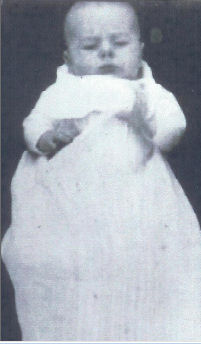
As the grandparents and uncles and aunts were rejoicing, Lonevie related a humbling experience she had a few days before the baby's birth. Many years later, Ira described that event in these words: "Mother was staying down to Aunt Marge's place and went out before daylight for something. She went over to the corral, and there was a Heavenly Choir singing; she said it was the most heavenly music she had ever heard, and it went from over to Aunt Marge's house west and finally died out and when mother went in the house where Aunt Marge was, the tears were streaming down her face, it touched her so much." Years later, when Ira received his Patriarchal blessing, he was told that many souls rejoiced when he came to earth.
Ira was raised and spent his boyhood days in the upper part of the valley in Coyote. In early 1873 about twenty-two men came to the valley while on a peace-keeping mission to the Fish Lake Indians. While there they caught and earmarked several coyote pups which led to the area's name. The meadow lands were used as early as 1873 for grazing but several families settled in the valley in 1878.
This small community in Southern Utah, two hundred miles south of Salt Lake City, was settled by Mormon Pioneers from the disbanded United Order. Their most common means of livelihood was the raising of sheep and cattle, and a few irrigated crops. In 1880 antimony, a metal used in alloys, was discovered in nearby Coyote Canyon, so Coyote became a mining town as well as a ranching community. The Warners settled in Coyote around 1884 and the Frosts in 1888. In 1921 the town of Coyote was renamed Antimony after the metal mined in the area.
Chauncy had to leave his family alone most of the time and this gave much of the responsibility for the children to his wife. Ira's mother was a woman of pioneer stock and knew how to take care of herself.
She knew how to use a gun, as Ira recalls one time seeing a coyote just below the house in the road. His mother got the rifle and shot close to it to frighten it away.
As a youngster, Ira had a dog named Tige. The story is told how Tige saved his life when he was just old enough to wander. He toddled to the nearby bank of the river when it dropped off several feet. About twenty feet out, the river was swift and swept down into a hole. Ira wandered dangerously close to the edge. The little dog, sensing the situation, started barking. This aided his parents to find and rescue him in time to save his life.
Another incident in Ira's early life is a favorite story he often told. In his own words, "One time when mother was home alone with us kids, we'd go over to Grandpa Warner's and after dark, coming home, I got per' near home and heard something scream and I asked mom what that was screaming like that and she said, 'Oh, I guess it was the old red cow screaming for her supper.' And we got home and had to go through a big clump of brush, the road went down across the creek and through a clump of brush to the house. We was up there and she said, 'You kids, keep a-hold of my skirt tight as you can!' We held, Elva and I held onto her skirt and she carried Net and she sure made heels fly getting through that clump of brush and up to the house. After we got to the house we heard this mountain lion scream. He was over south of the house. We hadn't much more than got in the house than mother blinded the windows with a quilt. Net was the baby and she wanted a drink and there wasn't a drop of water in the house. About fifty or seventy-five yards down they usually had water running down the creek and so mother, she took the dog and she ran as hard as she could go down to the creek and got a bucket of water and come back. She was too scared to have Net crying for water so she ran down to get a bucket of water and while she was gone the lion hollered once more and he was going toward the hills then."
In his early childhood,
Ira was fortunate to live close to his grandparents, uncles, aunts
and cousins. His father, Chauncy was the son of Samuel Buchanan Frost
(a blacksmith) and Ester Davis. Ira's mother, Lonevie Warner, was
the daughter of Mortimer Wilson Warner (a farmer) and Christens
Brown. In his own words at seventy-three, Ira commented about his
grandparents: "My father's name was Chauncy Frost, son of Samuel
Buchanan Frost . . . I think he died before I was born, (he died June
1888) but Grandmother Frost was a great profile amongst us kids . . .
sure thought a lot of Grandma Frost . . Samuel Buchanan Frost, my
grandfather, was the first family convert to the church and he
converted his father to the church and he was a close associate to
the Prophet Joseph Smith; he has wrestled with the Prophet many
times. One morning the family was all sitting around the fireplace
getting dressed and a knock came at the door. Grandma Frost went to
the door to see who was there, and there was a stranger at the door
and he asked Grandma for a needle and thread, he wanted white thread.
She got it for him and he pulled his robe. . . whatever it was he was
wearing, he pulled it back and pinned it in the front of the inside
of his lapel on his robe and grandma said the skin under his robe was
as white as the driven snow. He gave the boys a lot of good
instructions. Grandma said he talked awfully good to the boys and
told them not to do the things they shouldn't. After he left, he'd
been gone long enough they thought he was at least off the doorstep
and they went outside and looked all around. Their house was up on a
kind of a high place . . . they looked in every direction and they
couldn't see him. He just disappeared." 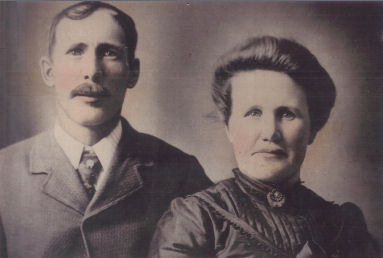
Chauncey and Lonevie Warner Frost
Ira had many good
experiences with his Grandpa Warner. He went fishing with him when he
was barely old enough. These were choice experiences and he remembers
many good times. He especially enjoyed hearing of Grandpa Warner's
experiences of living the United Order in Circleville. Quoting Ira,
"After the order broke up, Grandpa Warner went to Coyote and it
seemed like everything he would turn his hands to, it just seemed to
make money for him. This was a concern to him and so he sought the
Lord in prayer. He prayed to the Lord that if this accumulation of
money should cause him to turn away from the church, that he wanted
the Lord to take it away from him. Soon after this, he began to fail
financially, losing his stock until he was again of very humble
means.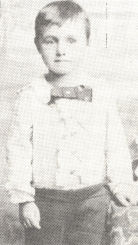
Ira as a boy
Little Ira went with his father whenever possible. His father would tie him on the horse, and then lead it. One time, the horse suddenly threw his head and bloodied Ira's nose. He recalled that "dad really laughed at me." His first teacher was Emma Clayton. Later she married his uncle. It was quite a distance to go to school. Ira described it as going up a quite a big hill, back down across a stream and up a bank, then up another hill, over to the school. They walked unless it was stormy weather and then their dad would take them on the horse.
The school was a log house. When they had to recite for the lesson, they sat at a long recitation bench. He and his cousin, Wilson Warner, used to race to the bench to see who could sit by Clara. They always seemed to get a crush on the same girl, first Clar Robinson, then Linda Clayton. They often rode part way home with Linda and her brother in the buggy.
Wilson and Ira grew up as close buddies, a relationship which lasted a lifetime. They were about the same age, so near the same size, and looked so much alike that their mothers often boxed one at the side of the head, thinking it was their boy, and getting the wrong one. It is not surprising that they looked a lot alike, since they happened to be "double cousins". Ira's mother was a sister to Wilson's father, and Ira's father was a brother to Wilson's mother.
Among the experiences of
his childhood, he tells about herding cows along the foothills. He
stopped one day by a big flat rock that had a wide crack in it where
the wood rats nested. He decided to build a fire in the nest and
smoke the rats out. Reaching in, he got more than he bargained for
when he pulled a rattlesnake out by the tail. He was so frightened
that he immediately rounded up the cows and went home, though it was
still the middle of the afternoon. Other experiences was helping his
dog chase coyotes out of the strip of brush near his home, and always
being on the watch for the many cougars that were around. 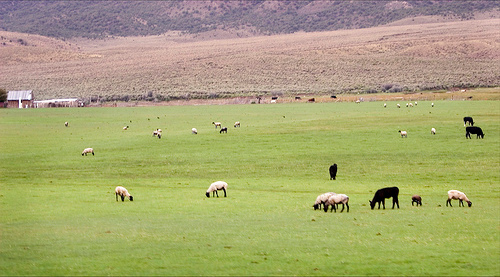
Sheep and cattle grazing in a pasture near modern day Antimony
As a youth, Ira's Christmas's consisted of candy, nuts, and an orange or apple, usually oranges. Oranges were not readily available, but somehow, they always found them on Christmas morning. His first toy, which was very special to him, was a train made completely of wood. There were plenty of evergreens nearby which could have been used for Christmas trees, but they never had one at home. Their Christmas tree was always at school. One year, in preparation for Christmas, Ira's mother sent him over to Aunt Marge's with a note and some money. When he returned home he told his sisters they were getting little fry pans for Christmas. On Christmas morning the girls looked through their gifts and asked their mother where the fry pans were. His mother turned to Ira and said, “Oh oh, you read my note, did you?”
The frame church house where he attended all of his meetings was some distance from their home. He and his cousins often walked and sometimes rode with Grandpa Warner in his wagon. They usually rode horses to primary. Ira was baptized on his ninth birthday, Sept. 11, 1900 down the lane by Bishop King's house. Levi King baptized him and he was confirmed by George Black. At the age of twelve he was ordained a deacon.
From his early childhood, Ira loved to fish. His father made their fishing lines by twisting black thread together. The first fish he remembers catching was on Bolder River (or Bolder Creek), where his father was herding sheep. It was about this same time, while camping with his father, that a grizzly came into camp. Chauncy fired several shots, causing the bear to turn and run. Ira had to practically walk over the top of the frightened sheep, as they had banked up tightly together, in order to follow the bear. As they spotted the bear the dog whirled and ran back to camp. Ira remembers heading for the tent and covering up his head as he was trying to not hear as his father whipped the dog.
Another time he was
fishing on the bend with his Aunt Vine (who was only a little older
than he) and Grandpa Warner. Grandpa and Ira's father did not like to
fish with the kids as they would throw their lines in, splash, and be
too rowdy. Yet the kids usually caught their share of the fish. This
particular day after fishing, Ira and Vine decided to go home
early. They played along the way and, passing some Indian burial
grounds, shoved the ends of their fishing poles into the soft mounds.
When Grandpa followed behind them a little later, he could see the
tracks of a lion which had followed them and dug around in the ground
at each point they had shoved their poles in the dirt. Grandpa was
worried but then relieved, as a little further along, discovered the
lion had gone it's separate way into the west hills. Ira managed to
go fishing at times throughout his life. He especially enjoyed some
of the trips in his older age with friends and relatives. He still
did some fishing up until the time he became incapacitated.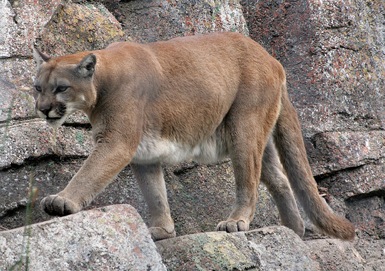
Ira knew how to pray and was a humble child. One experience which helped build his testimony was when he had come home from school with his younger sisters. His mother had gone to Circleville, and as the children passed their Grandma Frost's place, they saw their father and uncles working there. Cora was sick with the croup, so Ira took her home on the horse, helped her in and started to build the fire. After going back into the house with the wood, he saw that she had fallen across the floor and that her eyes were glassy. Although frightened, he knelt down and prayed, got on the horse and rode at top speed to Grandma's house to inform his father. Arriving back home as quickly as possible, Chauncy, with a jerk, picked her up and broke the phlegm loose in her throat, thus relieving her.
Ira spent most of one
summer over on Boulder Creek with his father, who was tending a
community herd of buck sheep. One time Ira had to go down a ways from
camp for water. He saw a place on the trail where a lion had drug a
sheep across. They saddled their horses and trailed the lion for some
distance but were unable to catch up with it. They spent a lot of
time gathering pinenuts, then roasting and shelling them. By the time
Ira was ready to go home, they had quite a bag full. He tied it onto
the horse with his other belongings and started out early in the
morning for the full days' ride home, stopping for lunch at Lost
Springs. 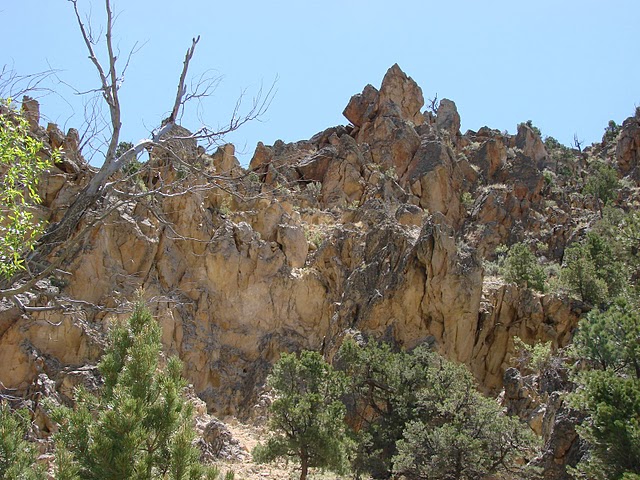
Coyote Canyon
It seems Ira had many opportunities to be by himself and be able to do just what he wanted. In his own words he said, "I used to leave home and go up on the mountain horseback and I'd be gone two or three days. I don't know how mother put up with it. She must have worried quite a bit and she didn't know where I was or anything about me, but I'd go up and stay at the sheep camps and ride out over the range and visit with them."
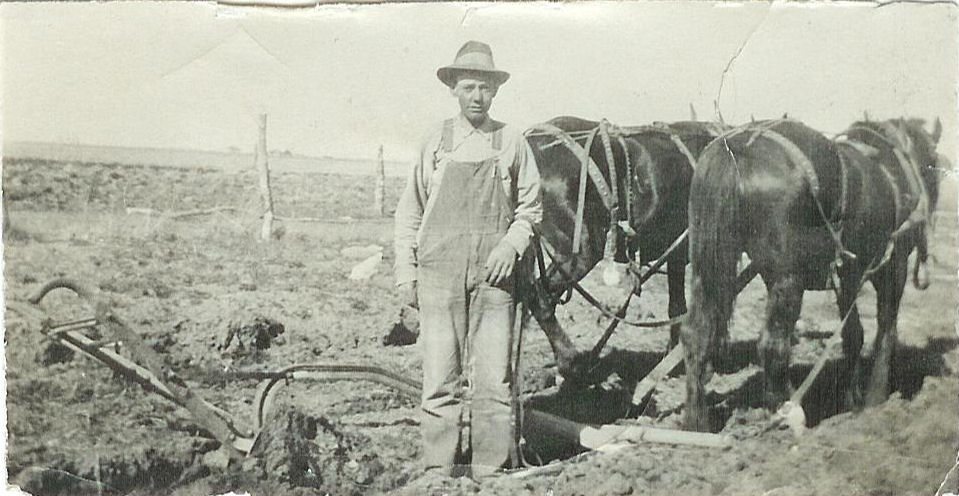
Ira as a teenager plowing
Other memories Ira had of his early life in Utah was of the things he did with the Grave's boys, who lived above them two or three miles; of the time they were learning to shoot their guns, and Ira got a flesh wound in the neck. The lead had to be dug out with a pocketknife. The Grave's boys didn't have anything good to say about the Mormons, but apparently, they must have been influenced by people like Ira, as they later joined the church. He told about an old prospector named Frank Dowdy that could tell great stories in which he didn't know what was the truth and what was real, but his stories were great. Also there was a fellow named Ike Coley (or Colby) who Ira worked for a little. It was with him that he had the experience of killing his first deer. He was in the west hills and there was a lot of snow drifts even though it was early spring. As he shot and saw the deer fall, he was so excited he left his gun sitting on the side of the hill and slid over the snow bank to cut it's throat. The deer reached up and struck him, clawing the skin off Ira's ear with his hind foot. He struggled until he finished the job and dressed it out and left it. When he went back to get it, the creek had risen and he told Ike he could have it. By the time Ike got to it, the deer had been half eaten by a lion. His next deer was killed just a short distance from home in the foothills. His father helped him get it home. Although Ira was only fifteen, he was starting to help supply food for the family needs.
Being small and fast as
a teenager, Ira became well known for his ability to train race
horses. Three of his uncles, Ivan, Neil and Marian, had race horses
and Ira helped train them. There were two fellows named Palmer
and Dan Day, for whom he trained horses. He worked out at a place
below Circleville, where Ben Lewis had a race track. Dan Day owned
two horses which Ira was especially fond of, one named Ned and the
other called Paddell. Ned held one of the Utah records as the fastest
in his category. Paddell was a great big horse, lanky and tall which
made him hard to get onto and off from. This horse was known to like
music and would try to dance when it was playing. He told about
trying to sweat Ned down one time for a race, as he was carrying too
much fat. They ran him, loped him, and then put blankets on him. They
had a device made of wood and hoops that they used to scrape him
down, causing the water to pour off him.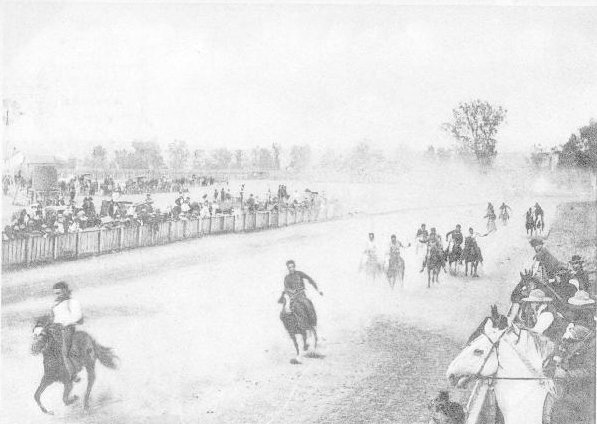
A drawing of a 1906 horse race
Chapter 2